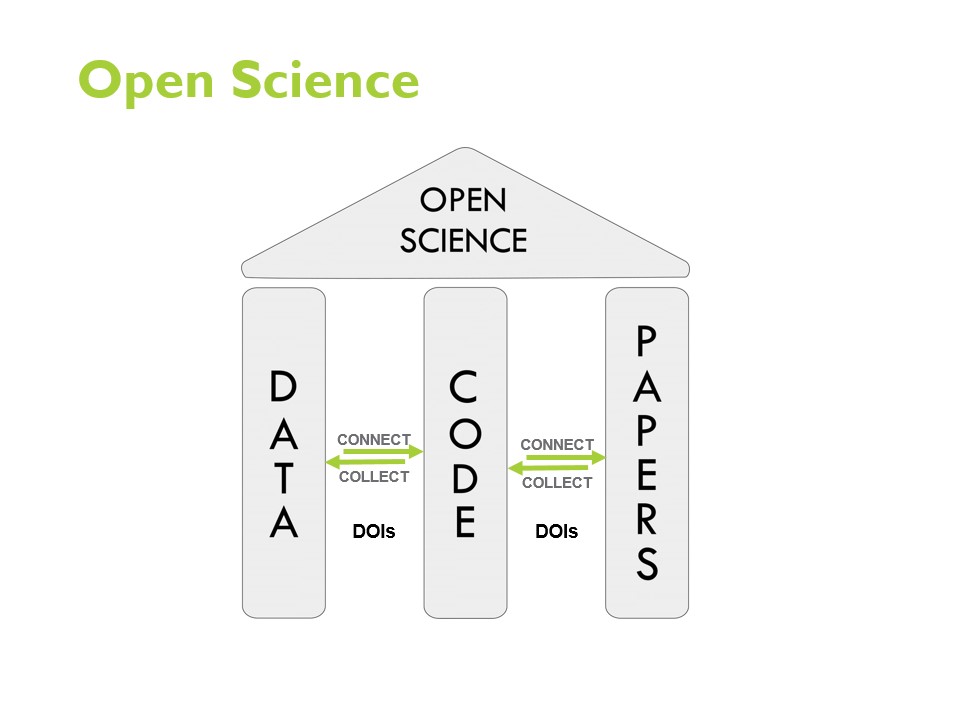Digital Object Identifier (DOI)
A Digital Object Identifier (DOI) is a type of persistent identifier (PID) typically assigned to a digital resource, such as an article, dataset, software, or other scholarly work. The DOI provides a persistent and updatable link to the resource, making it easily identifiable and locatable on the internet through a persistent link. DOIs are commonly used in academic and scientific publishing to ensure the permanence and citability of research outputs. They serve as stable and permanent identifiers for digital content, enabling reliable linking, referencing and tracking of scholarly works.
When accessing a digital object through a DOI link, the DOI resolve system redirects the accessor to the resource’s current location. This capability ensures that even if the original location changes (e.g. new host if the old location becomes inaccessabile or unavailabe), users can still access the content using the DOI, which will resolve to a link to the updated location. Each DOI is associated with metadata that provides essential information about the digital object, such as the authors, title, publication date, and publisher. This metadata is permanently stored with the DOI and facilitates accurate and comprehensive citation and discovery of the content.
The use of DOIs has become a standard practice in scholarly publishing and other digital content distribution platforms, promoting the permanence, reliability and accessibility of research outputs in publications and on the internet.

Modified image retrieved from A Practical Guide for Immproving Transparency and Reproducibility in Neuroimaging Research
Open Data, Open Source Software, and Open Publication Access form the foundational pillars of Open Science. DOIs play a crucial role in enabling seamless retrieval and utilization of openly available data by software, while research papers can reliably and accurately reference the software and data employed in the research process. This facilitates findability, promotion of research, verification of results, and data reuse for novel analyses by other researchers.
DOI and Research Software
As discussed in the previous section, DOIs ensure the citability of research outputs, which include research software. DOIs are crucial to all three levels of reproducible research software: research software for publication, research software as a tool and research software as infrastructure.
Software used for critical or novel elements of the research or its results should be cited in any publications. In this case, the specific version of the software used should be referenced. In this way DOIs provide an essential service for these specific citations with preserved meta-data about the software and version, and a location to find the specific software version relevant to the research.
Even small, research project-specific analysis scripts that are important to your research, but often are not reusable in other contexts, are important to deposit and identify persistently. Other researchers may still build upon these scripts in ways you do not expect. But most importantly these software are essential to be FAIR findable and accessible in order to make your research FAIR reproducible and, as a result, are just as worthy of DOIs.
When the research software is designed for broader use, using DOIs to cite this infrastracture research software facilitates standardization and consistency, so that results can be compared to like results.
The use of DOIs provides the ability to measure citation counts and usage metrics of the software. These data provide valuable data on how the software is being used in the research community as well as its impact and reach. These data inform future support and development, and document its value to funders and stakeholders.
Many funding agencies, journals and institutions are increasingly requiring that research outputs, including software, be assigned DOIs. This requirement helps to ensure compliance with funding requirements as well as to promote best practices in research asset management.
Research software often have multiple released versions. Each version may contain subtle changes, which can result in different outputs so specific versions of software can be crucial for reproducibility and verification. A DOI can be created for a software project generally, which points to the collection of released and preserved versions of the project. A DOI can also be created for each specific version. DOI systems will link projects and versions bi-directionally making it easy for a link to one to find the other, and each to be presented in the context of the other. In this way DOIs provide a robust mechanism for research software projects and versions: research can reference the specific version of the software used to generate results, which is ideal for publications and citations, and users can easily find a research software project and its latest version for reuse.
DOIs are widely recognized and integrated into academic databases, libraries and indexing services. This integration helps ensure that research software can be found easily, and accessed by researchers across different platforms and disciplines. Some notable examples are Zenodo by CERN (European Organization for Nuclear Research) and the Research Software Directory by the Netherlands eScience Center.
Benefits of Citable Research Software
There are benefits to you and the whole community to make this work more visible and more citable. Part of the reason publications are valued as they are is because there exist systems in place to make it very easy to find, cite and use publications. Research outputs like software were once considered non-traditional options mainly because it was so difficult to track and manage. These tracking and management systems and tools now exist today. Your research software is valued and should be held at the same level as other research outputs, as demonstrated by publications. These benefits are achieved through using persistent identifiers (DOIs) for software and all of your research outputs so that they too are just as easy to find, cite and use, all key aspects of FAIR principles.